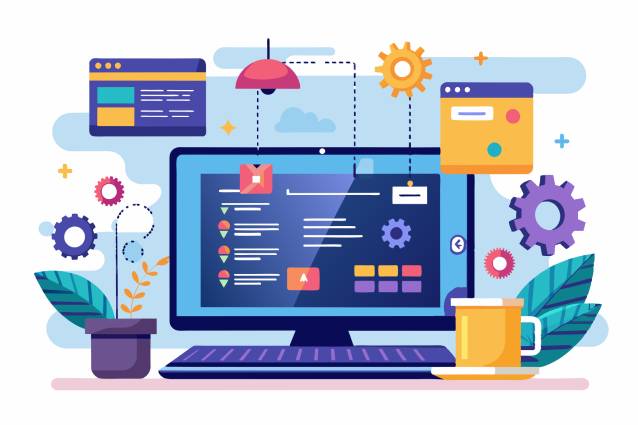In today’s fast-paced business environment, making informed decisions is more critical than ever. Companies that base their strategies on accurate data, customer insights, and market trends are better equipped to adapt, grow, and outshine competitors. Salesforce CRM consulting can be a game-changer in helping businesses leverage the full potential of their CRM data, driving better decision-making, and ultimately supporting sustainable growth Customizing Salesforce to Fit Business Goals Salesforce is a versatile platform with a wide range of customizable features and modules. However, many businesses don’t fully leverage these capabilities because they lack the expertise to tailor the platform to their specific needs. Salesforce consultants specialize in customizing Salesforce to align perfectly with a company’s unique workflows, industry requirements, and growth objectives. With a customized Salesforce instance, businesses can track the metrics that matter most to them, gather relevant insights, and make more precise decisions. This custom approach ensures that the CRM system becomes a powerful tool that supports decision-making and business growth rather than a generic solution that’s only partially effective. Benefits: Enhanced Relevance: Customized Salesforce instances track data that directly impacts business goals. Improved Decision-Making: Accurate and relevant data insights enable companies to make well-informed decisions that drive growth. Streamlining Data Collection and Management Data is at the core of effective decision-making. Salesforce CRM consulting can help organizations establish streamlined data collection and management processes within Salesforce, ensuring that the data entering the system is accurate, up-to-date, and relevant. Consultants assist in setting up automated data entry workflows, data validation rules, and integration with other data sources, minimizing manual errors and reducing data silos. With accurate data on hand, businesses can make decisions with confidence, knowing they’re based on reliable insights. Benefits: Improved Data Accuracy: Automated and validated data entry reduces errors and ensures high-quality data. Seamless Integration: Connecting Salesforce to other data sources provides a comprehensive view of business performance. Leveraging Advanced Analytics and AI Capabilities Salesforce offers advanced analytics tools, such as Salesforce Einstein Analytics, which provides AI-driven insights to help businesses understand customer behavior, predict trends, and make strategic decisions. However, not every business has the technical expertise to maximize these features. Salesforce CRM consultants are skilled in implementing and configuring these advanced tools. They can help businesses leverage AI and predictive analytics to gain actionable insights, improve forecasting accuracy, and identify growth opportunities. By empowering companies to make data-driven predictions, consultants enable better planning, resource allocation, and strategic decision-making. Benefits: Data-Driven Predictions: AI and analytics provide predictive insights, helping businesses anticipate customer needs and market trends. Enhanced Strategic Planning: Better forecasts and insights lead to more accurate business strategies and growth initiatives. Optimizing Customer Segmentation and Personalization Customer segmentation and personalization are key to effective marketing and sales strategies. Salesforce consultants help businesses configure their CRM to segment customers accurately based on behavior, demographics, purchasing history, and more. With Salesforce’s robust data segmentation tools, businesses can create personalized experiences that resonate with each customer segment. This targeted approach enables companies to tailor marketing campaigns, adjust sales strategies, and deliver highly relevant content to customers. By understanding and addressing each segment’s unique needs, businesses can boost engagement, drive customer loyalty, and ultimately increase revenue. Benefits: Effective Targeting: Segmentation allows companies to direct efforts toward high-value customers and specific segments. Increased Customer Loyalty: Personalized interactions lead to stronger customer relationships, enhancing customer retention and long-term growth. Enhancing Sales Productivity and Efficiency Salesforce consultants help businesses streamline sales processes within the CRM by configuring features like Sales Cloud, workflow automation, and task management tools. By optimizing Salesforce to match a company’s sales workflows, consultants make it easier for sales teams to manage leads, prioritize opportunities, and close deals more efficiently. With automated processes in place, sales teams can spend more time on value-adding activities, such as engaging with prospects and nurturing leads. This boost in productivity enables businesses to scale their sales efforts and increase revenue with fewer resources. Benefits: Increased Sales Efficiency: Automation reduces repetitive tasks, enabling sales teams to focus on high-impact activities. Faster Deal Closures: Streamlined workflows allow sales reps to close deals faster, driving revenue growth. Improving Customer Service and Satisfaction Salesforce CRM consulting can also significantly enhance a company’s customer service capabilities. By setting up and configuring Service Cloud and other support features, consultants ensure that customer service teams can access a 360-degree view of each customer, enabling them to provide faster, more personalized support. With access to customer history, preferences, and previous interactions, support teams can resolve issues more effectively, leading to higher satisfaction rates. A high level of customer satisfaction improves customer retention and encourages positive word-of-mouth, both of which contribute to business growth. Benefits: Better Customer Insights: A comprehensive view of customer data enables support teams to deliver more personalized service. Higher Retention and Satisfaction Rates: Improved customer service leads to increased loyalty and repeat business. Facilitating Informed Decision-Making with Dashboards and Reporting Salesforce offers powerful reporting and dashboard features that, when configured correctly, provide decision-makers with real-time insights into business performance. Salesforce consultants help set up customized dashboards, KPIs, and reports that focus on the data that matters most to each department. These reports enable leaders to monitor performance across sales, marketing, customer service, and other areas, making it easier to identify trends, track progress, and adjust strategies as needed. With these insights at their fingertips, decision-makers can make data-backed choices that drive growth. Benefits: Real-Time Insights: Custom dashboards provide instant access to critical data, enabling quick, informed decisions. Cross-Functional Visibility: Comprehensive reporting allows leaders to track performance across all departments, fostering collaboration and alignment. Scaling Seamlessly as Business Grows One of the key advantages of Salesforce is its scalability, and Salesforce consultants ensure that the CRM system is set up to grow alongside the business. As a company’s needs evolve, consultants help optimize Salesforce features, add new modules, and integrate additional systems to accommodate growth. By preparing Salesforce to scale efficiently, businesses can avoid disruptions, reduce downtime, and maintain smooth operations as they expand. This seamless scalability












